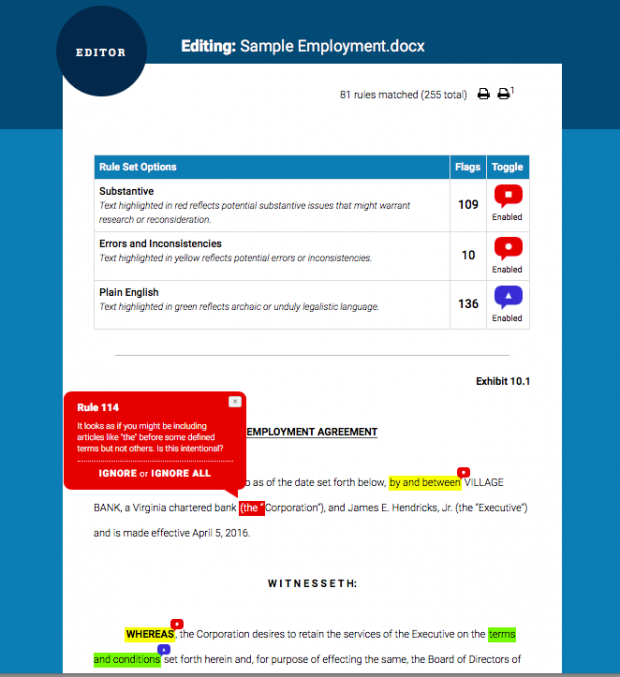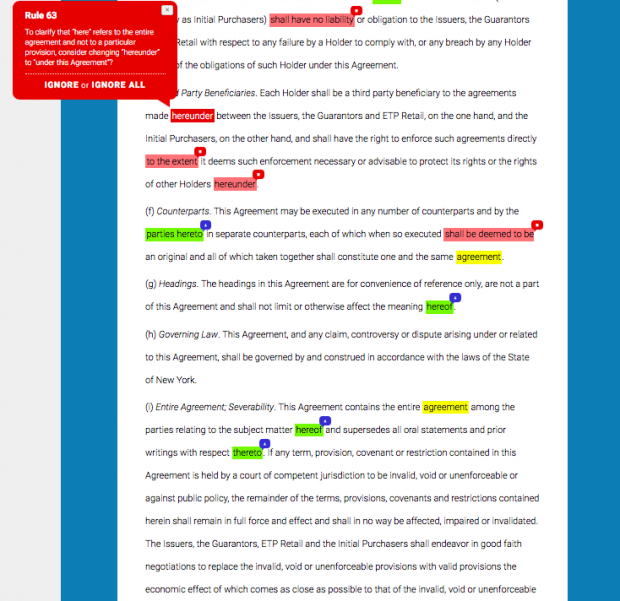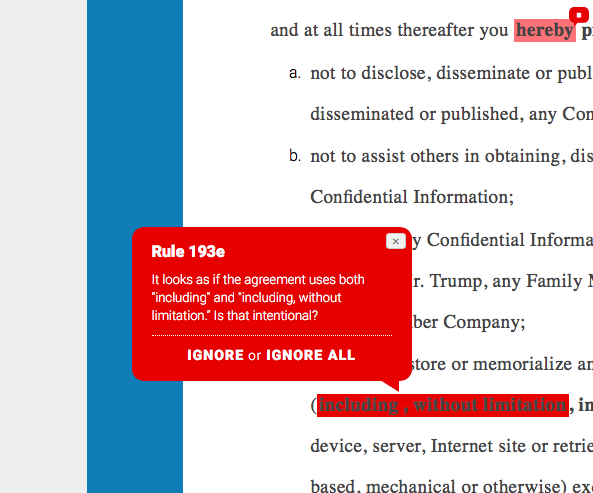How To Improve Your Writing And Draft More Effective Contracts
Here's a new product that transactional lawyers should check out.

Gary J. Ross
Over the last few days, I was invited to use a program called Contract Catch. Contract Catch is a tool that helps you catch errors in your contracts, and to also refine your contracts by eliminating inconsistencies and using more precise language.
Contract Catch was developed by Ross Guberman. Ross is the president of Legal Writing Pro LLC, and he travels around the country world giving presentations to attorneys to help them improve their writing skills. (I guess it beats my life of sitting in an office 24/7.) Contract Catch is a natural outgrowth of his efforts in trying to improve how attorneys write and the words attorneys choose.

Curbing Client And Talent Loss With Productivity Tech
The program is very simple to use. You upload the contract on which you’re working, click the type of review you want — either “Substantive,” “Errors and Inconsistencies,” “Plain English,” or a combination of the three — and voila! The results are instantaneous. The contract will be Christmas-treed with highlighted text, all corresponding to one of the above review types (or “Rule Set Options,” as the program terms it). You can toggle the reviews, so if you only want to look at Errors and Inconsistencies, you can simply disable the other two.

The user needs to be able to get over her initial reaction to seeing almost all of the document highlighted. When I’m reviewing a contract and make a change widely applicable to the rest of the contract, I’ll simply make the change in the first instance, and then write and circle “global change” next to it. I expect others to do the same. Contract Catch doesn’t do this, instead highlighting every single occurrence of the offending text. This is even more annoying than it sounds. However, after I managed to calm down a bit, I discovered there are “Ignore” and “Ignore All” options, like with spellcheck. So after you’ve taken note of a comment and either made a global change or decided not to, you can click Ignore All and then all of those particular comments go away. I have to admit, clearing the comments is a satisfying experience. When you reach the end and clear the last comment, there’s no doubt left that it’s a better document than what you started with.

Sponsored

Curbing Client And Talent Loss With Productivity Tech

Law Firm Business Development Is More Than Relationship Building

How The New Lexis+ AI App Empowers Lawyers On The Go

AI Presents Both Opportunities And Risks For Lawyers. Are You Prepared?
Many of the comments are not actually corrections. The tool highlights terms that it considers “archaic”, and disfavors legalese. For example, the tool does not like “provided, however”, which is a frequent word pairing in agreements. Frequent as in it appears several times in nearly every contract. As in, not going anywhere anytime soon. (Note: Ross reminds me that Contract Catch doesn’t actually say not to use “provided, however” — it just asks you if the language that follows is truly an exception or if it’s really a condition (in which case it should be changed to “if” or “only if”).) However, many of the suggestions are good — particularly if non-sophisticated parties may be reading the contract — and are easy to incorporate, such as replacing “in the event that” with “if.”

Contract Catch does a good job of catching capitalized words that are not defined, and definitions that are not used. In my mind, this feature alone is worth the price of admission. It can easily take over an hour for a lawyer to check all of the definitions and capitalized words in a lengthy document, and I’ve noticed in my Microsoft Word if there are a lot of comments in the document sometimes the Ctrl + F feature doesn’t work correctly, which can really leave you up a creek. Contract Catch also catches things like stray commas, which can be easily overlooked if you spend most of your life in the “All Markup” mode, and won’t always get caught by spellcheck.
I recommend the tool, particularly at the price of $250/year, which seems low to me (though I’m not sure if it’s something that can necessarily be passed on to clients). It’s worth $20 or so a month to never send out another contract with words that aren’t defined or with inconsistent language (another area the tool handles particularly well). I can also see a role for Contract Catch in helping junior attorneys think more critically about the words in a contract. I know when I was a junior attorney, I had a tendency to assume whatever was in the precedent contract was correct. Contract Catch can help attorneys shake that habit faster, and really look at and think about the words used in a contract.
Contract Catch is being offered to ATL readers for a limited time for the discounted price of $190 for the first year. Subscribe here and use the code “ATL190” in the next 96 hours. Full refunds are available during the first week to any unsatisfied users.
Sponsored

AI Presents Both Opportunities And Risks For Lawyers. Are You Prepared?

Happy Lawyers, Better Results The Key To Thriving In Tough Times
Gary J. Ross opened his own practice, Jackson Ross PLLC, in 2013 after several years in Biglaw and the federal government. Gary handles corporate and securities matters for startups, large and small businesses, private equity funds, and investors in each, and also has a number of non-profit clients. You can reach Gary by email at [email protected].







